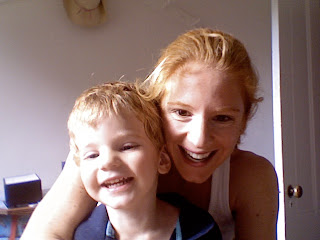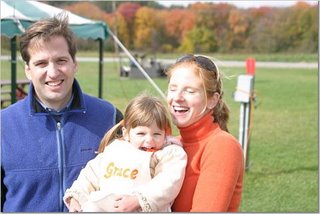
 My little man. He is such a moment of transition. His babyhood clings to him, but he’s really turning into such a little person. He’s in the throes of the terrible two behaviors – tantrums, screaming, falling apart when he doesn’t get his way. Stubborn refusal to do what I ask of him, staring me down while blatantly flouting a rule, and generally being difficult: these are all central behaviors right now. I swear it’s as though he decided he was going to make up for being a super mellow baby for his first two years. Some days it feels as though he spends a solid 9 or 10 hours a day screaming and yelling (and the other 14 or 15 he is usually sleeping).
My little man. He is such a moment of transition. His babyhood clings to him, but he’s really turning into such a little person. He’s in the throes of the terrible two behaviors – tantrums, screaming, falling apart when he doesn’t get his way. Stubborn refusal to do what I ask of him, staring me down while blatantly flouting a rule, and generally being difficult: these are all central behaviors right now. I swear it’s as though he decided he was going to make up for being a super mellow baby for his first two years. Some days it feels as though he spends a solid 9 or 10 hours a day screaming and yelling (and the other 14 or 15 he is usually sleeping).
But at the same time he’s such a downright little love. He is quick to say, “I love you, mummy” and is always eager for a hug and a kiss. Sometimes I go into his room before I go to bed and lift him out of his crib (cage, fine) and rock with him in the rocking chair, and he curls sleepily into my arms, resting his blond head on my shoulder and being so calm and content I often find myself crying. The tenderness in those moments is heartbreaking because I know its time is running out. The last vestiges of babyhood in Whit are fading away fast, and this time in my life is coming to an end.
The combination of Whit’s occasional warmth and gentleness with his fundamental boy-hood – the throwing-hitting-climbing-jumping that everybody told me would be there (and is) represents the kind of man I aspire to raise. My relationship with Grace, so thoroughly documented and overanalyzed in this blog, is complex, intense, full of identification and the impossible-to-untangle wishes I have for both her and my child self. Whit, however, brings a different set of challenges and joys to the emotional table. Chief among these is the deep sense of responsibility I feel to raise a truly good man – a man who will engage intellectually and ethically with the world, who won’t be afraid of his own strength and will in fact cultivate it, and who will respect women as both equal to and different from himself.
A more articulate summary of what I’m talking about:
“I think a lot about the man Charlie will become … I can’t seem to get used to the fact that one day I’ll be the mother to a man, and that somewhere within that man will be the wild little boy who barreled through the house with a dump truck, and the tender boy who pretended to nurse his dolls. Maybe that’s part of the appeal of being the mother of a boy: the chance to plant something gentle in his soul, to give the future a small gift – a man who can be as loving as he is strong.” – Jody Mace


